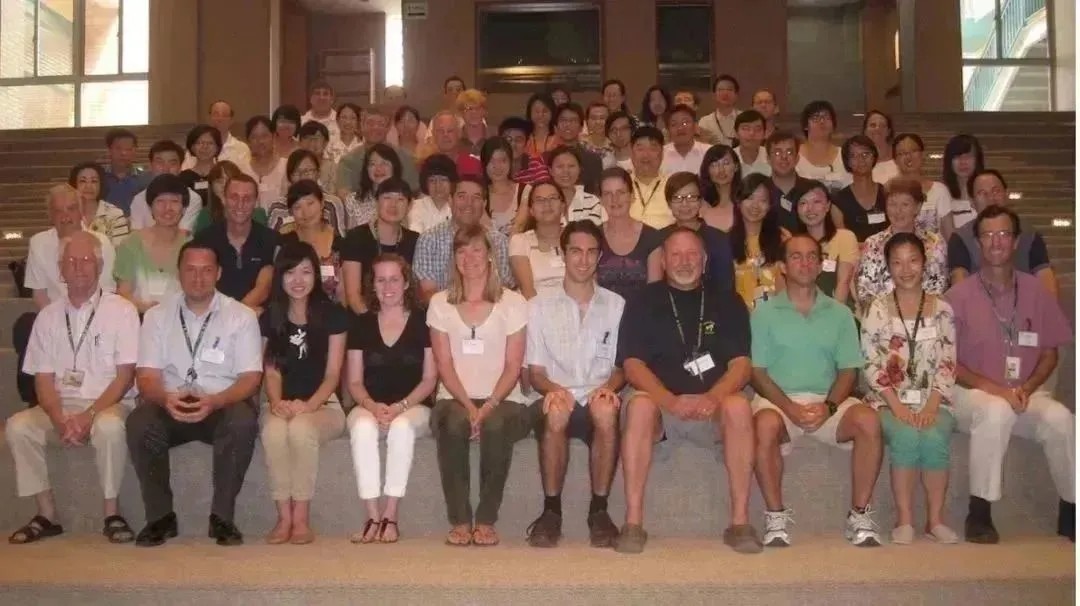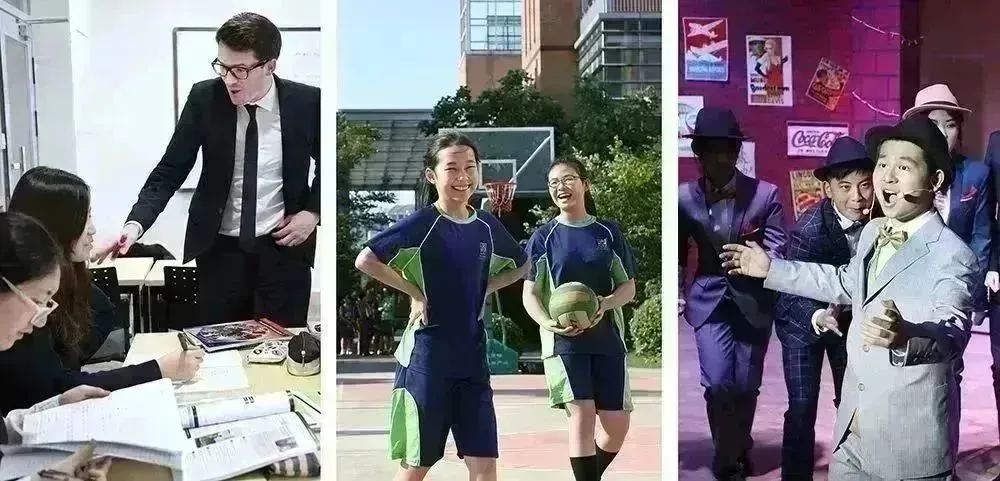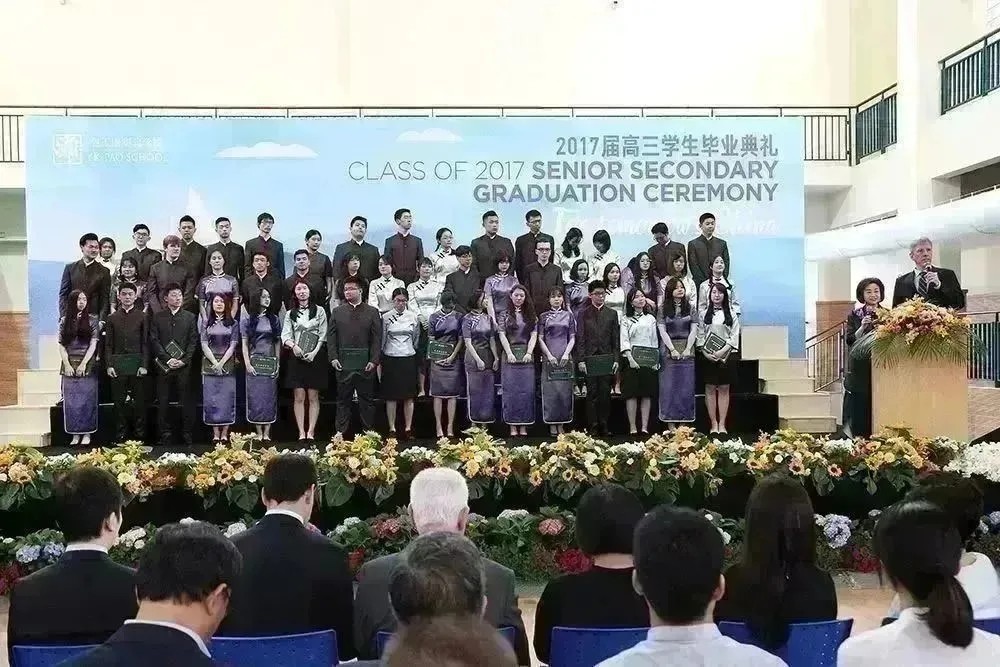From the Primary School on Wuding Road, through the Secondary School in
Songjiang, the Founders have always taken a prudent and meticulous approach
in choosing each campus’ location. Over the years, much effort has been spent
on choosing locations for campuses that are not only visually beautiful but
also promote learning through carefully considered design.
Finding a home for the Secondary School Campus
Over the past decade, Songjiang campus has settled into its own unique identity and grown in student number - from 75 pioneering students in the school’s first year to over 500 students today. After the opening of the Middle School in 2017, the Songjiang Campus officially became home to Year 9-12, offering both boarding and day students a new home and community.


The founders and the Songjiang campus team celebrated the campus opening
Looking back on the early days of Songjiang Campus – from site selection to campus construction – the project can be said to be the project of the combined hard work, wisdom and strength of the founders and school leadership team. As early as 2007, the founders started the process of selecting a site for the Secondary School campus. At that time, they travelled and inspected 30-40 locations within Shanghai. After some initial setbacks, they eventually chose Songjiang, a scenic location away from the hustle and bustle of the city centre, to establish the new campus.

Professor Anna Sohmen Pao and Wu Zijian, then President,
supervised the construction of the Songjiang campus
After the school site was confirmed, a comprehensive reconstruction of the site began immediately under tight time constraints. In order to transform the campus into one that met Pao School standards, the project team made adjustments to the entire campus to meet the school’s needs. As part of the remodel, the team completed work such as erecting corridors between the buildings, adding temperature regulation to the swimming pool and sound absorption to its ceilings. Under the guidance of Professor Anna Sohmen Pao, the team also designed and transformed the campus green spaces.
Professor Anna Sohmen Pao recalls, “At the time, there were no experts on the team, we all had no experience and were rushing to complete the work in the hot summer."

On October 20th 2010, the school held a press conference on using
recycling of materials from the 2010 World Expo (Shanghai)
Coincidentally, the campus’ development coincided with the 2010 World Expo in Shanghai. After the World Expo concluded, items from the site of the event were recycled for use on Songjiang campus, reflecting the founder’s value of sustainable development, and can still be seen on campus today.
Despite challenges throughout the campus selection and development process, the Founders and leadership team persevered and made the necessary changes, eventually opening the campus to students in October 2011.
Lanco Ke, the current Director of Operations at Hongqiao campus, served as the principal’s office coordinator of the Secondary School as it was established. She recalls that before moving to the Songjiang campus, the teachers and students spent a month in the Wuding campus before the Secondary School could be officially opened. When they officially moved to the Songjiang campus, Mike Spencer, then Principal of the Primary School, and Crick Chen, the Deputy Principal, gave then Executive Principal of Secondary School, Tony Jaccaci, a traditional Chinese gong to wish a smooth start. Principal Jaccaci, who loves Chinese culture deeply, cherishes it very much. Since then, in the school's large and small assemblies and important activities, Principal Jacacci would also open the occasions with a loud gong.

In 2011, in the first parent meeting at Songjiang Campus,
Principal Jaccaci welcomed the parents with loud gongs
Since opening, the school has continued to welcome improvements to Songjiang campus, including dorm refurbishment, cafeteria upgrades, and changes to the fire protection equipment due to updated governmental regulations. The school has invested ample time and money into developing Songjiang campus, not only ensuring that the quality of construction is high but also creating the best learning environment possible. During his tenure at the school, Wu Zijian, then President of Pao School, travelled between campuses every winter and summer holiday, supervising and ensuring the quality of the school’s various construction projects.
Developing a Unique Cultural Blend on Campus
Alongside the physical development of the campus, the school had to create a suitable academic programme, whilst also developing a structure for the boarding and CCA programmes. In addition, those first students, teachers and parents were fundamental in planting the seeds for the community-oriented and active campus culture present today. Zang Na, Dean of High School External Affairs and humanities teacher, who was part of the founding team, recalls that Principal Jaccaci used to say in Chinese that every teacher in Pao School wore many hats - as a teacher, coach on the playground, and parent in the dormitory.

Tony Jaccaci and Year 12 students in the Oxygen Bar
As with the school’s vision to both pass on traditions of Chinese culture, whilst fostering an international perspective, the Secondary School also had the challenge of cultivating a successful bilingual and multicultural campus. In order to create a truly cohesive community, it was necessary to build common ground and a core Pao School culture that started with the teachers. The school’s leadership therefore made concentrated efforts to promote integration between the school’s local and international teachers, with the faculty being evenly divided between Chinese staff and overseas staff from around the world.

Staff training day during the second year of Songjiang Campus
Principal Jaccaci chose to focus on cultivating an environment that encourages teachers to be both teachers and learners. For example, the foreign teachers spent time being led to learn more about China, including Chinese language and culture, from local colleagues. In fact, Principal Jaccaci himself served as a role model for these ideals, as someone who speaks fluent Chinese and deeply appreciates Chinese culture. In addition, local colleagues learned about Western classroom management strategies. In time, those early teachers created a culture of growth and cooperation amongst the faculty, which continues to be passed on to new additions to the school.

Tony Jaccaci sounds the assembly gong to start the next school week
Andrew Hamilton, Director of International Admissions and Alumni Affairs, has experienced the school’s growth since its early days. He recalls that the campus was very small in those early years, with almost everyone living together on campus. As everyone knew each other well, the environment created a unique blend of work and life. Since then, it has also become Pao School tradition to integrate Chinese and international cultures at the end of the Teacher Orientation Day. For example, Chinese employees help international staff choose Chinese names, sharing with them the reason and meaning of the name. As part of the tradition, everyone uses a calligraphy brush to write their new name on rice paper as a souvenir.
Pao School was something that didn't exist before, in lots of ways this truly was new,
truly novel. It is a very unique and special type of institution. I feel very proud to have
been able to work so hard. I've never really been part of such a collective effort to
create something that was so unique and special before. The three founders had an
incredible passion for doing something different, doing something important, and
doing something that would really change students and education in China.
Mrs Sohman was the visionary, she would come and inspire us - she is the spirit
of the place, I think. She came to Songjiang many times to give advice and
encouragement. Madam Tan was absolutely the bridge between China and the
international world. She helped us navigate some very difficult and challenging
situations and has a deep, deep love for the kids. I also have a special place for
Phillip in my heart, as we worked very closely together. He is incredibly talented
at putting others at ease and making them feel valued and important.
-Tony Jaccaci, Executive Principal of the Secondary School (2009-2015)
A New Academic Programme
As a school with experimental status, that is, a school with more flexibility in teaching than standard schools, Pao School had to make some key decisions in its early days regarding the academic pathways that would be available to the school’s students. At the core of the programme, the school had to meet the government’s curriculum requirements, but would also build on this content to prepare students for higher education abroad – with both the needed linguistic and academic skills. In 2014, Pao School was approved by the Shanghai Municipal Education Commission to become one of the first secondary schools to trial international courses in Shanghai.

YK Pao School becomes an IB school
In the early years of Songjiang campus, an essential resource for the school was the Pao School Mentors, which was led by Mentor Matthew Wu, who still provide guidance today across all campuses today. The mentors are retired, well-accomplished Chinese educators, who are familiar with the Chinese curriculum and government requirements. Through this experience, the mentors are important sources of pedagogical knowledge and act as indispensable resources for the school. In those early days, each teacher was paired with a mentor, who would support the teacher in giving feedback and advice for programme and lesson plan building.
In order to provide students with the best learning resources, the school’s founders and leadership made personal donations of books to the school. In addition, they worked to create a partnership with the Director of the Shanghai Library, eventually winning a donation from the institution. Without leaving the school, students could use both physical and online resources to read nearly 50 million books from the Shanghai Library, more than 2,000 newspapers and periodicals, and scientific and technological materials. During the process of building the school, founder and Deputy Chairman Tan Fuyun also gradually introduced various technological resources to campus. According to her, in addition to EP courses, the school has also designed special offerings in sports, music, and art, and frequently invites both international and local experts to the school to help cultivate students' talents and open their horizons.

On Songjiang Campus’ opening day, the founders and board members visited the new classrooms
A Programme for the Whole-Person
Alongside the cultivation of the mind, whole-person education also calls for the nourishment of the body and spirit. Therefore, as the school’s academic team was designing the Secondary School’s structure, great importance was placed on the development of the co-curricular and boarding programmes.

One important choice made in the formation of the Secondary School was to include a boarding school programme, similar to that of ones in top schools across the US and UK, with the aim of providing a rich and supportive environment where students learn outside the classroom and develop a range of skills including independence, initiative, and collaboration. The school also decided to have faculty members live within the dorms as dorm parents, alongside grouping the students in mixed ages. This allows teachers to model behaviour for students, provide an immersive whole-person education environment, forge stronger student-teacher bonds, and also build a wider sense of community.
Boarding life not only helps students develop good character, but also teaches them how to get along with others, cultivates self-management skills and helps them become more independent and disciplined. Further, the boarding environment is an ideal place to cultivate enduring friendships that benefit the students long after they graduate. In this warm, inclusive, and secure environment, students can fully devote themselves to learning and growth.
The boarding programme develops vital team building and cooperation skills, as they
must learn to live with other students of different characters and ages. A large part of
our secondary education is for the single child to learn to get along with others, even
people they don’t like. In life, you're put together to work with different people, so they
need to learn all those cooperation skills. In a dormitory, students also must learn
self-discipline, so that they can keep their space tidy and keep their own time schedule.
—— Professor Anna Sohmen Pao
Co-curricular activities (CCAs) play an important role in the goal of whole-person education - acting to broaden and extend students' traditional classroom education. Through CCAs, students can develop interests, expand hobbies and embrace new challenges. And, by doing so, have the opportunity to become more independent, gain more responsibility, develop social skills and build friendships.
As a non-profit school, Pao School has always incorporated character education into students’ day-to-day education. Pao School believes that it is important for students to achieve academic excellence, adhere to the school’s core values and do their utmost to be socially responsible. In order to raise societal awareness of autism, with Philip Sohmen’s support, Pao School established the Founder’s Challenge swimming competition in 2013. Held annually, the event embraces the theme “Swim for Love”. The Starwalker Swim Team, an organisation that provides autistic children with the opportunity to swim, joins the school for the activity – allowing the children to interact with their peers and pursue their athletic dreams. At the same time, the event raises funds used to support swimming training for autistic children. Over the years, Swim for Love has blossomed into one of Pao School’s best-known traditional charity activities.

Philip Sohmen, Executive Deputy Chairman, participated in the “Swim for Love” activity.
The First Graduates
Standing side-by-side with the school,
With countless firsts,
I still remember,
That hot summer three years ago,
Founder facing the blazing sun,
Running and running through the campus construction site,
I still remember,
The constant improvement of campus facilities,
The swimming pool, library, auditorium, laboratory...
May the children make good use of them, let others feel envy and sigh!
I still remember,
The fragrant aroma of coffee in the fourth-floor conference room,
At the "Principal’s Coffee Time",
Information sharing between schools and parents.
I still remember,
The monthly meeting in the principal's reception room,
That's the principal, the head of the school
Engaging with PTA representatives.
I will always remember that time in Year 7,
20 teachers, 75 children,
On the luxuriant campus
Day and night sharing joys and sorrows,
We were as close as a family.
Students,
More and more by the year,
As Principal Tony also looks trimmer by the year...
The above poem, which describes the journey of Songjiang Campus, was written by the mother of alum Derek Yan for the school’s first high school graduation ceremony. In fact, the trust and support of Pao School parents are part of what has allowed the school to remain inspired and to develop the confidence to overcome challenges and move forward. Paul Wood, then Executive Principal of the Secondary School states, "Those families and parents were such brave pioneers, they had such faith in the Founder’s vision that they committed their children early on to Pao School. They stayed with Pao School during challenging times as the school grew and developed.”

The first graduating class of Songjiang Campus
In 2017, Songjiang saw its first class of graduates, IB results, and university placements. Though the school was still young, the Class of 2017 were admitted to a number of the top universities in the world, including Ivy League schools in the United States, the University of Chicago, Rhode Island School of Design and the UK's University of Oxford.

Pao School’s first High School graduating ceremony
With this first graduating class, came the first graduating ceremony. The special occasion incorporated traditional Chinese elements, such as performances from the school’s Chinese drum ensemble. From the traditional Chinese graduation gowns to the magnificent performance of the school’s Zhoushan Gong and Drum Troupe at the ceremony, Pao School’s honouring of Chinese culture was visible throughout the ceremony.
The Zhoushan Gong and Drum Troupe was originally set up in 2016, under the initiative of founder Professor Anna Pao Sohmen to celebrate the intangible cultural heritage of percussive music from YK Pao's hometown of Ningbo. Since its establishment, the Zhoushan Gong and Drum Troupe performs often at Pao School, including at graduation ceremonies, concerts, New Year events, or other large-scale events such as school anniversary celebrations.

More than five years past, some of the school’s graduates have returned to China after completing their university education and begun to emerge in their respective industries. Many have expressed gratitude for all that Pao School has done for them, as they now begin to give back to society.
Pao School remains the most unusual school I’ve ever worked at. It really does feel like
the community spirit had grown together, with the parent body amazing in their pride in
being part of the school community. I think that sense of togetherness reflects the
Founders’ vision, who were always very passionate about the school. Their visits to the
school were always a great way to maintain that vision and inspire us all to work towards
a school that would bring together the best of Chinese and other educational systems.”
- Paul Wood, Executive Principal of the Secondary School (2015-2018)
* Songjiang campus is referred to as Secondary School until middle school year levels were relocated to Hongqiao campus.